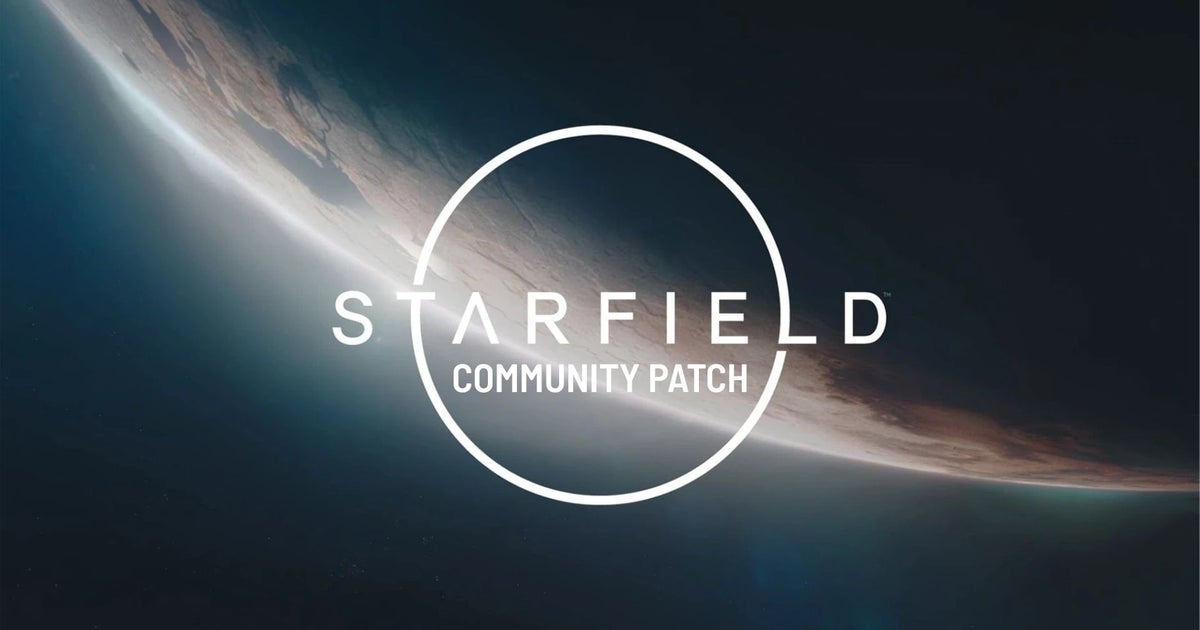Two months on from the release of Starfield, players are still waiting for Bethesda to address the numerous bugs which are present. But there’s a whole other group of players out there taking matters into their own hands – the team behind the Starfield Community Patch, an ambitious and surprisingly professional taskforce trying to fix the game themselves. The project came under the spotlight about a month before Starfield released. It was wild to think that a group of modders could already be working on a mod for Starfield before it had even released, but there they were – anticipating the Bethesda jank fans have come to expect.
The SCP’s goal is to improve the vanilla experience of Starfield for players by fixing everything from major bugs to spelling errors, so long as it presents some sort of issue for players of the base game. The scope of the patch doesn’t include new content, balance changes (outside of correcting obvious errors), or anything which doesn’t fit with Bethesda’s original vision for the game.
I spoke to Timothy “Halgari” Baldridge, one of the founders of the SCP, to find out why the team came together to, in essence, do Bethesda’s work for them, and ask whether they’ve ever had any contact with Bethesda. I came away from our chat with a deeper appreciation for the project, which is more than just a simple effort to improve the experience of Starfield. It’s a collaborative effort between several modders and players to create a truly community-owned, open-source project, with standard practices of software development in place.
Modders Pickysaurus and Halgari first began discussing the idea of the SCP as early as December 2021, Halgari tells me over video. The desire wasn’t just to create a patch with fixes for Starfield, but to create a project which would be open-source – free for anyone to download or use in their own modding work. “Traditionally, the main [unofficial] patches for Bethesda games have been directly controlled by one or maybe two people,” Halgari explains, “and what gets accepted, what doesn’t, is completely up to them”.
The question they asked themselves was “what can we do right now to start laying the groundwork so that no one, not even Nexus [Mods] – the people in charge – can control the project?” It took a while for the team to come up with an answer to that, but resulted in the team applying an MIT License on the code. The MIT License is open and loose, allowing people to take SCP and publish their own mods with it so long as the licence is included within any child projects.
From there, the number of people contributing to the project has grown, but the team remains dedicated to keeping the patch small and self-contained whilst it’s in its early stages. “We want this patch to be community-owned and we’re going to get a jump on it first, and we’re going to get our name out, and get everything set up so that this will be free this time,” Halgari explains. “We’re trying to keep it focused, have good tools for people, and try to serve the community.”
Keeping the patch small for now ensures not only the issues of ownership and licensing can be ironed out from the start, but also means the core team of modders behind SCP can set up standard software development practices which aren’t common in the modding scene overall. SCP asks people to ensure discovered bugs can be replicated, so it can be checked by testers. I liken the team’s testing process to QA to Halgari, thankful my short stint as a software developer has come into use finally, but he reveals they’re going all out to keep as many software development best practices involved as they can.
Code is hosted on GitHub, meaning there’s proper source control and automation tools can be implemented. Halgari tells me about a tool fellow SCP modder Noggog has been working on for two years which he describes as “git for Bethesda plugins”, allowing changes to be tracked.
The drive to put these kinds of practices into a community modding project comes from years of experience in software development. Noggog works in finance software development I’m told, while Pickysaurus and Halgari both work for Nexus Mods. Halgari didn’t work for Nexus before SCP was first conceived of, he clarifies, but the response from the company to SCP has been supportive. Nexus is happy for Halgari to be involved with the project “as long as what I’m building on the patch isn’t actively hurting the company,” he tells me. “I think people are concerned that having a couple of people that work for Nexus working on the patch might be a conflict of interest,” Halgari also reveals, and stresses the licensing was put in place to stop anyone from taking sole ownership of the code – not Nexus, not even Halgari and his fellow modders who’ve built the foundations of SCP together.
Despite two years of patch preparation for a game which only came out two months ago, the work for SCP has only just begun. Its ever-increasing issue backlog is to be expected due to the sheer size of Starfield, and Halgari thinks it’ll be around for years. At this point I have to ask the question most people probably want to ask the team – how does it feel to do what Bethesda hasn’t so far, in polishing Starfield?
“I don’t see it as a problem,” Halgari says. “Some people are like ‘Bethesda’s sloppy’ or whatever, but I’ve done software development [for long] enough that there are some times where you just say it’s going to take too long to fix that and we won’t make any money off of it so [you don’t bother]”.
What’s more frustrating for those working on SCP, and the wider Starfield modding community, is how difficult it is to work with Starfield’s code without official modding tools and support. This isn’t helped by the delayed mod tools from Bethesda, which the company says are coming at some point next year.
“Modding is still very young for [SCP],” Halgari explains, before pointing me to work done by prominent Bethesda modder ElminsterAU. ElminsterAU has been working on a version of xEdit, a modding tool for Skyrim, compatible with Starfield. In the release of xEdit for Starfield, ElminsterAU explains why it took over 400 hours to get an initial version working, despite Starfield running on Creation Engine 2, the successor to Skyrim and Fallout 4’s engine.
“It is evident from analysing both the data structures in the provided module files and from decompiling game code that modding capabilities were not a consideration in the development of the game engine up to now. This can also be inferred from the fact that there has been no quality assurance testing of modding functionality from Bethesda, as various current engine bugs that appear in the context of using mods would have been obvious showstoppers. Any existing modding capabilities appear to be incidental, stemming from the engine’s legacy code base and the required work needed in that context to maintain functionality within the confines of editing Starfield.esm using the internal version of CK2.”
Halgari boils this down to simpler terms for me. “It’s essentially a hack, like they built this game thinking they would add modding some day, and they haven’t actually added it yet,” he explains. “The only reason we can mod it already,” he continues, “is because we’ve modded the other games using the same engine and we know what to do. But a lot of stuff is really broken compared to the other games.” Halgari estimates the modding scene for the game won’t take off until next year once Bethesda releases official mod tools.
The sentiment is backed up by Cartogriffi, community content manager at Bethesda, who explained in the Starfield Modding Discord why Bethesda’s website was given a UX revamp pre-pandemic for all sections other than Mods. “Mods was dead last for priority,” Cartograffi explained, “and when the pandemic hit it was easy to put it on the backburner”.
The lack of support and communication from Bethesda is one of the team’s biggest frustrations. The 400-plus issues currently backlogged for SCP could be addressed by Bethesda, but the team has no idea if it will. “Is Bethesda actually going to fix this stuff, are they going to fix the performance issues?”
“I have had more contact with [CD Projekt Red] directly than I’ve had with Bethesda, not through work,” Halgari jokes, when I ask whether SCP has ever had any direct contact with the studio. “Companies do talk, but Bethesda don’t, and it’s the weirdest thing,” he continues. “You would think that a company that has 100,000 mods to download, that has petabytes of data for modding your game would [communicate more].”
Halgari tells me something similar to CD Projekt Red’s mod support, which includes free tools to aid modders in creating, installing, and sharing their work would be great for Starfield. “Hey Bethesda, if you’re reading this, we would love to help with any of this too,” he jokingly adds, but I can tell Halgari means it. The SCP core team has decades of years of experience writing tooling for Bethesda’s games, and for them it’d be an amazing chance to work alongside the studio.
For now though, SCP thinks the biggest issue for the project in future will be how things are handled once its community grows bigger. “We’re wanting to go with less centralised control and more just community consensus,” Halgari concludes.

Laura Adams is a tech enthusiast residing in the UK. Her articles cover the latest technological innovations, from AI to consumer gadgets, providing readers with a glimpse into the future of technology.








